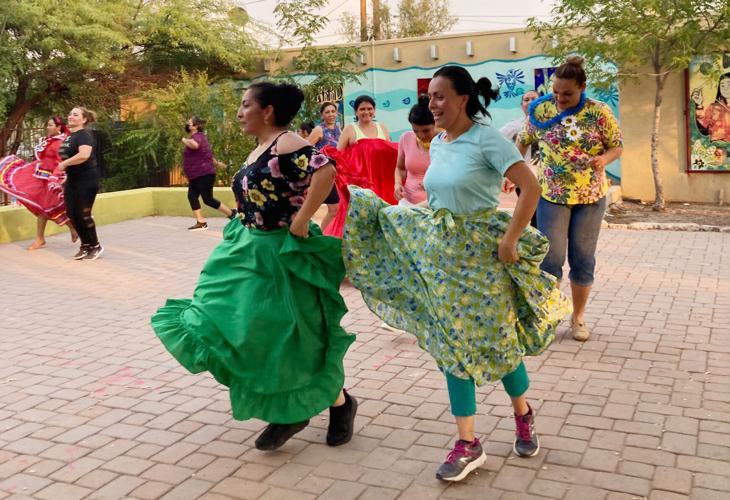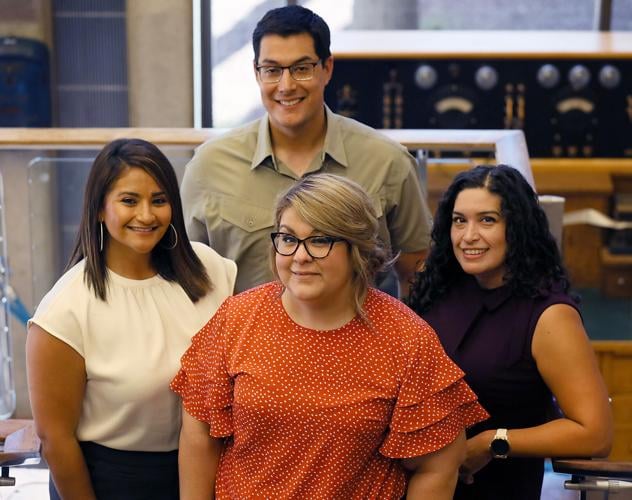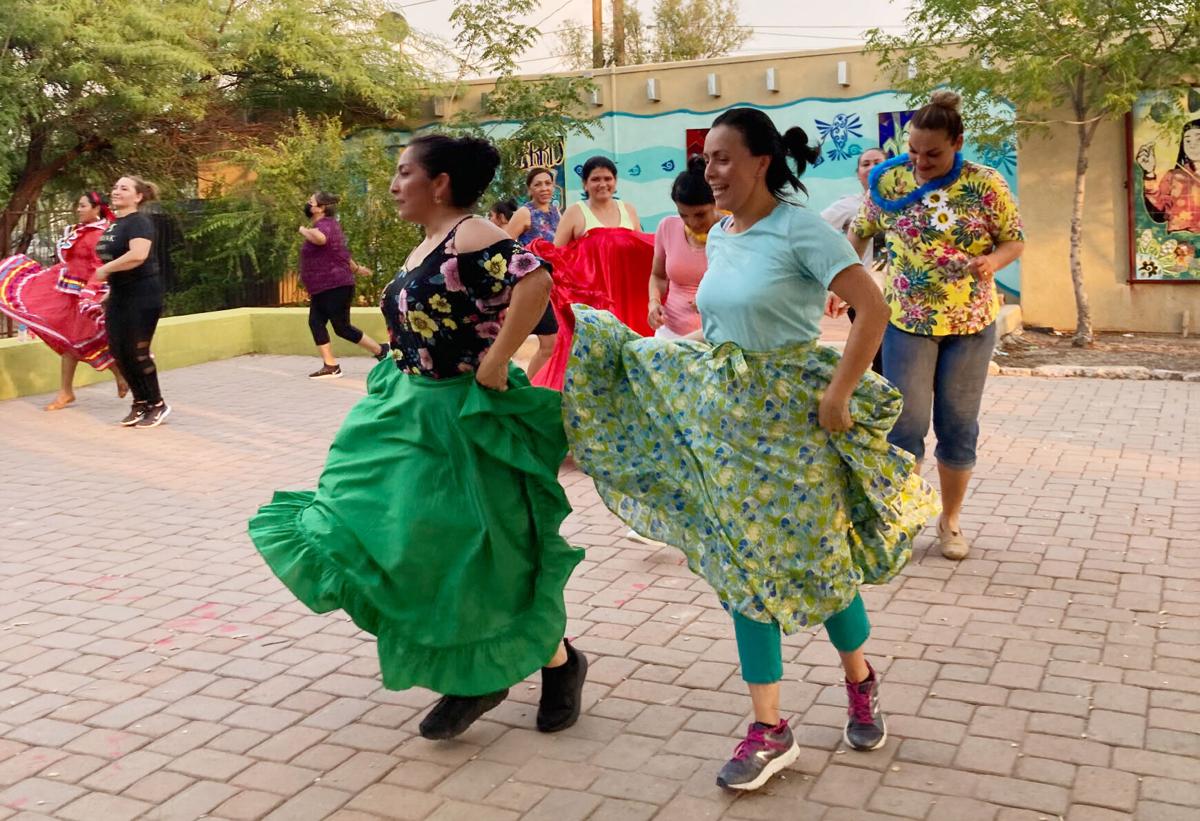On Monday, the promotoras dance.
The women of varying ages gather in a brick-cobbled courtyard, some of them wearing street clothes and others donning colorful, flowing skirts. Led by a member of the group who works as a Zumba instructor, the women twirl and turn in unison, toes pointed, as they learn folklórico.
And more importantly, they heal.
All of the women are survivors of domestic violence who have gone through the YWCA of Southern Arizona's Promotoras Rompiendo Cadenas (Community Educators Breaking through Barriers) program.
Hispanic women are at higher risk for gender-based violence due to a variety of cultural and institutional factors. One in three Latina women report having experienced physical violence by an intimate partner in their lifetime, according to the National Latino Network for Healthy Families and Communities.
Centers for Disease Control research has shown that one in 12 Latinas experienced such violence in the past 12 months.
And 63.1% of Hispanic women who identified being victimized in their lifetime reported having experienced more than one victimization, according to a Sexual Assault Among Latinas Study conducted by the Office of Justice Programs.
The promotoras program is one of many efforts within the community to engage and support Spanish-speaking survivors of domestic violence and sexual assault in services, whether that be seeking justice or receiving the tools they need to continue healing.
'We know that knowledge is power'
These efforts have increased substantially in recent years, thanks to some federal grant funding.
In 2019, Pima County was awarded $2 million as part of the Bureau of Justice Affairs National Sexual Assault Kit Initiative (SAKI) grant, to inventory and test cold case sexual assault kits. A portion of the funds were earmarked to address the disparity in response for people in underserved communities, including Spanish speakers and people who identify as LGBTQ+.
Three of the four Pima County Attorney's Office victim advocates assigned to the SAKI team are Spanish speakers. They work closely with Tucson Police Department detective Steven Acevedo in the adult sexual assault unit to notify victims of any updates in their cases as a result of the testing.
Acevedo's position is the result of a 2018 grant from the Department of Justice Office on Violence against Women to increase bilingual competency among investigators, sexual assault nurse examiners and community service organizations. The $747,000 grant also funded a bilingual police detective in the domestic violence unit, Ely Badilla.
The bilingual advocates and detectives work closely with the promotoras program, the Southern Arizona Center Against Sexual Assault and the Consulate of Mexico to assist Spanish-speaking victims, regardless of their citizenship.
Advocates Andrea Enciso, Ileana Lizarraga and Maricela Savalas were with the County Attorney's Office for years before being assigned to the SAKI team, and they say the collaboration efforts began years before the grant.
The biggest challenge has been helping victims get past the "gap of trust" in law enforcement, said Enciso, the team's lead advocate.
The Spanish-speaking community's trust in law enforcement was lacking for various reasons, the largest one being Tucson's history with immigration enforcement. But TPD has put in the work to rebuild itself and its relationship with Spanish speakers in recent years, Lizarraga said.
"I think law enforcement has done an amazing job in building that connection and that trust … with survivors in our community," Lizarraga said. "And they've been doing that simply by being present within our community."
Advocates aim to get involved with victims as early as possible, in order to explain the process and the confidentiality that comes with their roles. Even if the victim doesn't want to move forward with prosecution, advocates can help eliminate some of the fear as that person navigates their way through the recovery process, Lizarraga said.
They can also explain the process for obtaining an order of protection, as well as how to do safety planning for the future, Enciso said. "We know that knowledge is power."
The advocates are familiar with the various struggles a victim might face and can help describe and translate any forms that are not available in Spanish, which unfortunately is most, Savalas said.
They are prepared to assist with immigration issues and applying for U visas, which are earmarked for victims of certain crimes who can assist in investigation or prosecution. They are also well-versed in landlord/tenant issues and divorce.
But even with bilingual assistance, there are still barriers, Enciso said. The wait time for a U visa is substantial, and because only a certain amount are allotted each year, there's a backlog.
"They just don't know what this legal system looks like. I can't imagine what that might feel like in the moment of trusting the process and trusting that advocate and detective," Lizarraga said. "If they're from Mexico, it looks very different, so it can be hard to know who to talk to and where to go."
Advocates also have to explain to many victims the differences between the criminal justice system here versus in that person's home country. In many countries, the system centers around the idea of guilty until proven innocent, opposite of the Unites States' system.
And if a victim has had a bad experience with law enforcement in another country, he or she is less likely to seek help here.
"It helps when you have partners," Enciso said. "It's a lot easier if someone knows that this person will really advocate for them. We want to empower folks to access the resources they have but also be mindful that we may be throwing them into a system that they definitely have no clue how to navigate, so we might have to hold their hand a little bit longer."
Lizarraga said that while many victims do not want to prosecute, the law enforcement notification in sexual assault cold cases is a key component to a victim's path toward healing. For victims whose sexual assault kits were part of a backlog in testing, the apology they get from law enforcement for the initial handling of the case is an important first step, as is letting them know that resources and support are still available.
"That apology from law enforcement is such a huge and powerful thing," she said.

Andrea Enciso, left, Ileana Lizarraga, center, and Maricela Savalas, victim advocates with the Pima County Attorney’s Office, with Tucson Police Sgt. Steve Acevedo. A portion of PCAO’s multiyear Sexual Assault Kit Initiative grant has been earmarked to address disparities in underserved and underreporting communities, including the Spanish-speaking and LGBTQ+ communities.
If the victim wants to prosecute after the notification, a detective will conduct a second interview, and the case will be re-opened.
Because the advocates are assigned part time to SAKI, they also work a mixed caseload, which for some means new sexual assault cases, in addition to the cold cases they work on under the grant.
For the active cases, initial contact with the victim is key for developing rapport. The team aims for victims to meet and work with each advocate, so that he or she will feel comfortable with whoever is available.
Savalas said the outreach efforts have greatly benefited from increased collaboration with TPD and getting involved earlier in cases.
"You can say the words, but if your intentions behind it don't match, it's not going to be a successful program or connection with the community," Enciso said. "It's more than being bilingual, it's being bicultural and being willing to learn."
'A real commitment has to be made'
Detective Acevedo, who grew up on Tucson's west side and has been with TPD since 2005, said the department recognized several years ago that it had a gap in its ability to respond to and investigate cases involving Spanish speakers while using a victim-centered approach.
When Acevedo moved into his current position in January 2019, he said he was given a little creative license in terms of what his job would entail. The learning curve was steep at first, as he tried to quickly absorb information about the laws involving sex offenses, and about investigating with a victim-centered approach and cultural competency about the Hispanic community.
His first case involved a woman whose employer was extorting her for sex, but she was reluctant to go to police.
He said her reticence was due in part to local law enforcement's history with issues including SB1070, a state law that required local police to check the immigration status of anyone they stopped if they suspected that person might be in the country illegally.
She was also concerned about the Arizona Department of Public Safety's border strike force, which led to fears of deportation, and the political rhetoric about the border wall, he said.
The result of Tucson police keeping up with the mandates in laws such as SB1070 was substantial damage to their relationship with the Hispanic community, Acevedo said.
By contrast, the YWCA, the Mexican consulate and other community groups had already established themselves as trusted providers, and were receiving reports from domestic violence victims. Improving police communication with those groups has been instrumental.

Solutions journalism is rigorous reporting on responses to social problems. It intends to rebalance the news and focus not just on problems, but on potential solutions to those problems.
So have TPD's efforts to assure victims that immigration status is not an issue when you are the victim of a crime, Acevedo said.
TPD has a policy in its general orders, in place for years, to not ask crime victims about their immigration status.
Acevedo is also focusing on three initiatives.
He is hoping to establish a relationship with the Consulate of El Salvador in Tucson, as he already works with the Mexican and Guatemalan consulates.
He also hopes to connect with Clinica del Alma Health Center, at El Pueblo Center on the city's south side. Survivors receive care at Clinica del Alma, then are referred to a hospital, but Acevedo hopes to create protocols to allow police and advocates to meet them at that clinic.
The third initiative is to improve strategic communications in Spanish on social media and other venues, to get the word out about services for survivors.
"A real commitment has to be made to sustain this," Acevedo said of the grant-funded efforts. "First, because it's the right thing to do. Second, the demographics are changing, and thirdly, if it doesn't have that posterity or that continuation, then years later, we're reinventing this."
'We have the experiences of the life'
Imelda Esquer started the YWCA's promotoras program in 2016, after experiencing a domestic violence situation years earlier. Esquer said she went to a social service agency seeking help, and received a good referral to a center that helped victims like her.
Years later, while working toward her degree at Pima Community College, Esquer decided she wanted to create a program for underserved Latinas experiencing gender-based violence. She brought her idea to then-director Alma Jaramillo, who said "yes" right away and gave her clear goals.
While getting the program ready to launch, Esquer happened to run into a woman she met years prior in a support group at Tucson's Emerge Center Against Domestic Violence. The women had never spoken in the past but recognized each other instantly.
"We started working together, and we are like best friends since then. We have the same goal: to give something to the community," Esquer said. "We are not experts. I don't have the academic titles. That makes us unique, because we have the experiences of the life."
The program's yearlong Spanish-language training is for women who want to become advocates for other women who may be experiencing gender violence.
The program recognizes that people behave differently in response to traumatic experiences and that treating survivors with kindness and respect, and giving them choices, is key in their recovery. It has seen hundreds of women come through it in its five years, many of them undocumented.
Esquer said the promotoras are the experts when it comes to their needs as survivors and as Latinas.
One of the biggest needs right now, she said, is some type of counseling for undocumented women. Esquer experienced this herself, having been undocumented for years, and said that was the No. 1 reason she stayed with her abuser.
"That's why I understand these women," Esquer said. "Because it's very easy to provide solutions when you haven't been there. I respect those women, and the struggle that they face is very, very real. Nobody wants to be there."
Years later, Esquer still gets emotional when speaking about what she endured.
She said undocumented women experience two types of violence when they become the victim of a gender-based attack. There's the personal violence of the attack, which is followed by the institutional violence of encountering barriers in the system, she said.
With no access to housing, transportation, counseling and other types of support, an undocumented woman faces a closed door to services, Esquer said.
Earlier this year, she asked the promotoras how they heal, outside of counseling or therapy. Answers included gardening, hiking, cooking and dancing, and Esquer made those activities happen for them.
The folklórico group will perform in December at the YWCA's 75th anniversary celebration.
The creative outlet these activities provide gives something back to survivors that was taken from them by their abusers. After coming from a situation where there was always another person asserting violent control, "it's important for these women to have their own voices," Esquer said.
'So much more that we could do'
Although the pandemic's overall effect on gender-based violence is unclear, calls to one of Tucson's sexual assault crisis lines have remained steady throughout.
The Southern Arizona Center Against Sexual Assault received 1,034 first-time or anonymous calls to its bilingual crisis line during the 2020 fiscal year — October 2019 through September 2020.
For 2021's fiscal year, the most recent data shows 704 calls were placed between October 2020 and June 2021.
SACASA does not track the callers' languages, but supervisor Katlyn Monje said it regularly works with Spanish-speaking victims via in-person crisis response and calls to the crisis line.
The agency's services are available to all survivors and secondary survivors, who include their friends, family members and partners, regardless of their immigration status.
Earlier this year, SACASA launched a weekly Spanish language support group that has built momentum. The group is for people seeking to regain control over themselves and their surroundings by developing coping skills, Monje said.
The pandemic has posed obvious challenges to in-person services, especially group sessions, which are now held virtually. SACASA's office, at 1600 N. Country Club Road, is open for walk-in services, including medical forensic exams.
Unlike other agencies, SACASA has Spanish versions of all the documents and paperwork given out to survivors, including its comprehensive handbook that covers resources and how to report sexual assault.
SACASA's advocates will meet victims at the hospital, police station or wherever they choose and will accompany survivors as they make a report to law enforcement or attend court hearings.
"Our advocates will respond pretty much anywhere in Pima County, so wherever is most comfortable for the survivor or closest to them," Monje said. "Whatever that looks like, we'll respond and try to get out to the survivor versus making them find their way to us."
And SACASA advocates' communication with survivors is confidential, which is also the case with County Attorney's Office advocates.
"I want to thank SACASA for all the support it has given me to overcome aspects of my personal life through therapies and support groups. That has truly changed my perspective on life," one survivor said, speaking in Spanish. "God bless all the staff who work there, for all the attention, care and follow-up."
The Star does not typically name survivors of sexual assault or domestic violence.
SACASA tries to recruit as many Spanish-speakers as possible as sexual assault forensic examiners and advocates, and has a handful of each on staff, meaning it doesn't often have to rely on professional translation services. But Monje said it's a struggle to find fluent Spanish speakers who are available after hours.
Community partners, including the Mexican consulate, will assist SACASA with translation services for Spanish-speaking victims and make staff available any time of day or night, she said.
"We're very grateful to have what we have, but still, it's not enough," Monje said. "There's so much more that we could do, should do and need to keep working toward."







